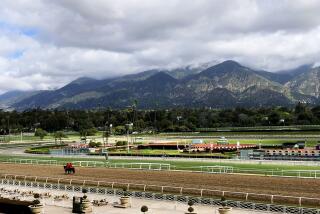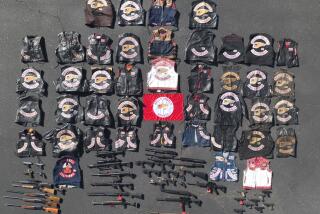Crocker Motorcycle roars out of the past with custom replicas
It was 70 years ago that a tiny shop on Venice Boulevard in downtown Los Angeles produced its last motorcycle.
At the time, Crocker Motorcycle Co. made the most powerful race bikes of any American manufacturer. But like other small companies facing supply shortages during World War II, it was forced to close, leaving only a few dozen bikes that have become a favorite of collectors and enthusiasts. Steve McQueen owned one before it was sold in auction for more than $276,000.
Now the Crocker is back, with a modern, limited-production version of the Big Tank V-twin. It will make its Los Angeles-area debut at this Sunday’s Calendar show in Calabasas.
Priced at $150,000, the new Crocker isn’t cheap, but neither is an original, presuming one can even be found. Only 100 or so Crockers were made, and the few that have come up for auction in recent years have sold for more than $350,000 apiece.
The new Crockers are likely to be just as rare. Only 15 of the handmade Big Tanks will be built at the Crocker shop in Torrance over the next year, according to Michael Schacht, the longtime motorcycle collector who spent 11 years working out the many legal and manufacturing issues involved with reviving the brand.
“Visually, the bike is 100% identical to the original,” with about 100 sandcast parts and a monstrous 80-cubic-inch V-twin engine that can power the bike well past 100 mph, said Schacht, who has combined the original styling with modern metallurgy and improved performance engineering with the help of the Southern California aerospace industry.
In future years, Schacht intends to replicate the Small Tank Crocker originally produced from 1936 to 1938 and introduce a modern Crocker design.
Schacht, 56, is a native of Toronto who made his money in the auto industry. He began replicating Crocker parts in 2000 based on borrowed bike bits from fellow Crocker collectors.
He began acquiring trademarks for the brand in 2002, and, in 2007, introduced a modern Crocker concept, called the C4, which never came to market.
After a fallout with his business partner, Schacht won the trademark rights and moved to the Los Angeles area to reestablish the brand because “I’m a purist,” he said. Just as “Harley-Davidsonbelongs in Milwaukee, Crocker was from L.A., so the dream was to bring it back here.”
Hailed as the “Duesenberg of motorcycles,” Crocker is the latest in a long line of storied motorcycles whose cachet has endured decades after the last engine bolts were tightened and the bikes wheeled out the door.
The U.S.-based Indian Motorcycle, along with iconic British Triumph, Norton and Brough Superior, are among the brands whose trademarks have been bought out of bankruptcy through the years and applied to new machines.
Indian, established in Springfield, Mass., in 1901, two years beforeHarley-Davidson, went bankrupt in 1953 and has changed hands almost a dozen times since. In 2011, it was purchased by Polaris Industries, which will bring 100% Polaris-designed Indians to market next year.
Triumph, established in Coventry, England, in 1902, reached its zenith in the late 1960s, went bankrupt in 1983 and was subsequently purchased by a wealthy British property developer who has grown the brand into the most successful English motorcycle manufacturer today.
Brough Superior, however, is the closest counterpart to the new Crocker. From 1919 to 1940, the English manufacturer custom built race bikes so esteemed they were known as the Rolls-Royce of motorcycles; T.E. Lawrence owned several. In 2008, British motorcycle enthusiast Mark Upham purchased the naming rights and has had no trouble finding buyers for the limited production replicas, selling for about $250,000, that he has been making since 2010.
Revivalism, however, isn’t without its controversies.
“Any iconic brand whether it’s a Crocker or Brough, on one side people say this is the best thing since this thing was invented, and then there’s people saying this is blasphemy,” said Gordon McCall, co-founder of the Quail Motorcycle Gathering in Monterey, Calif. In May, the Quail gave its Industry Award to the new Crocker, which “woke up the crowd” when it was kick-started and roared to life.
“It isn’t often a person tries to re-create and bring back into production an old classic motorcycle from the 1930s,” said Calendar show promoter Jim Gianatsis, who is hiring extra security this year specifically for the Crocker. “For one person to redesign and create an entire motorcycle from scratch is an incredible achievement.”
Even so, it isn’t likely to be embraced by collectors of vintage originals.
“Crockers are getting horribly hard to find,” said Virgil Elings, 72, a collector who bought a 1940 Big Tank Crocker three years ago for a price he won’t disclose and displays the bike among 150 others as part of his Vintage Motorcycle Museum in Solvang. As for the new Crocker, Elings’ only comment was, “It’s new.”
The new Crocker may not be prized by vintage collectors now, but even the replica is rare enough that it is likely to dramatically increase in value. The company has had several interested buyers already, Schacht said.
Even priced at $150,000, “we’re selling them for almost what they cost to make,” he said. “We were never in this for the money.”






